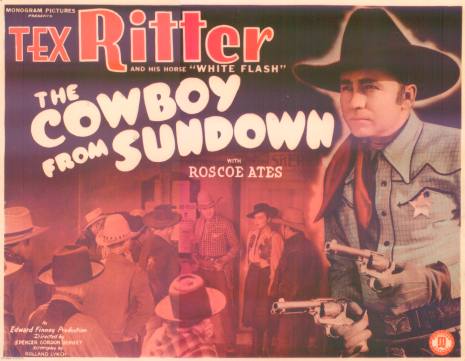
Thanks to Willie Nelson and Ned Sublette for helping me out with the title for this post. Brave man, Willie. Or just too old and cussed to give a big redneck damn. Anyhow, that's old news.
It's the day after Indpendence day as I write this, and what could be more American than cowboys and Hollywood? Well, blowing things up would be close, but we skipped the big fireworks display the nite before to attend a nifty little Jello Biafra lecture (Jello did have a bunch of fireworks displayed on the table behind him, so, you know, no question about the man's patriotism). So no pyrotechnics today. Just a little bit about a singing Hollywood cowboy.
Rex Allen, Gene Autry, Hopalong Cassidy, Roy Rogers, and even, unfortunately, Clint Eastwood. All of them can be seen at some point strumming an acoustic guitar and singing wistfully on celluloid. On a horse, by a campfire, or in the bunkhouse. It is the nature of Hollywood to present a fantasy world where we both believe, as the willing suspension of disbelief, in what we see in front of us as truth, but easily toss away as false when emerging from the cavernous theater (womb?) into a colder reality. But there's some truth to the singing cowboy, even if magnified by the silver screen, that notorious herald of myth-making and half-truth. The archetypical measure of masculinity and "don't fence me in" bravado leavened by the sensitive campfire troubadour that would give poor Robert Bly his greatest wet dream probably did not exist but for mythos, but certainly song has carried its weight in the tradition of "mighty male adventure", from the oral tradition and bards of yore to battlefield marches and military hymns of the not so distant past. Not til metrosexual dude ranchers shied away, embarrassed at any form of emotional vulnerability, did the concept of the cowboy campfire singalong get stripped from the shared story of the American West, relegated to old Hollywood serials and quaint remembrance of days past. Or something. Ask Baxter Black or U. Utah Phillips.
Tex Ritter may, very arguably, be the most talented of those Tinseltown tune wranglers. Certainly he's less associated directly with his film work, now, than with his body of song that coincided with, and outlasted, his oater persona. Ritter still clung successfully, after leaving film to focus exclusively on his music career, to his dogie-roping, range-riding cowpoke character, scoring a string of country and western hits before riding off for his final sunset in the mid-70's.
"Hillbilly Heaven" is a name-dropping paen to the golden age of forgotten westerns. "Blood on the Saddle" is an eerie narrative piece. And "High Noon" is, well, yeah, what you think it is.
Tex Ritter is the father of John Ritter.
And, for the record, I'll maintain that the greatest movie cowboy song of all time is "My Rifle, My Pony, and Me" from Rio Bravo and featuring the vocal talents of Dean Martin and Ricky Nelson. But that's for later.
Tex Ritter: Hillbilly Heaven (mp3)
Tex Ritter: (I've Got Spurs That) Jingle Jangle Jingle (mp3)
Tex Ritter: Blood On the Saddle (mp3)
Tex Ritter: High Noon (mp3)
Tex Ritter: Lady Killin' Cowboy (mp3)
Please support your local, independent cowpokes

3 comments:
I really enjoy your posts, especially that you write something instead of just tossing up mp3s. I like the Tex Ritter. This sort of Hollywood western music puzzles me as far as genre classification goes. I don't see it all that connected to C&W as we usually think of the C&W genre. These songs seem to have more to do with the film scores than with their contemporary music in Nashville. "High Noon" was written, after all, by Dimitri Tiomkin to match his score. I'm curious about the relationship between western film scoring and C&W music. Morricone's influence is rather obvious, even in pop country (see Brad Paisley's Mud on the Tires), but what about Tiomkin or Elmer Bernstein?
Also, the id3 tags on these mp3s have the artist listed at "Text Ritter." Notice the extra "t."
I think High Noon is a bit of a red herring,Ritter the screen cowboy didn't feature in High Noon he simply sang the theme tune.The bulk of the singing cowboy flicks were of the cheapish Saturday serial type. These were certainly influential though I suspect its harder to hear that influence post Honky Tonk.The issue of catergory is clouded further by the fact that singing cowboys such as Roy Rogers (sometime Sons Of The Pioneers member)& Spade Cooley were also (firstly) western swing stars. Both Merle Haggard and Waylon Jennings amongst others have paid tribute to the king of Western Swing Bob Wills (who also made some movies).I also think, certainly thematically,its fair to say that Marty Robbins was an inheritor of the singing (and therefore Hollywood) cowboy tradition, Robbins himself has admitted a debt to Gene Autry and songs such as San Angelo or El Paso etc could easily come from western movies.
Since our host mentioned Dino in his original post it is, perhaps, a happy coincidence that both Dean Martin and Tex Ritter recorded Detour.
These Tex Ritter tracks are great. I had heard 'Hillbilly Heaven' before by Cowboy Copas and this is just as good.
I have just added your link to my blogs so if you fancy some reciprication my blogs are www.noveltyrockemporium.blogspot.com & www.spunkyonions.blogspot.com
Youes
the R&RD
Post a Comment